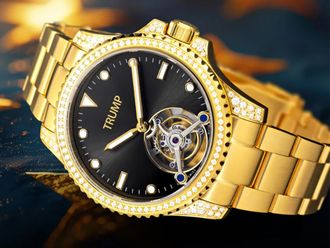Milan: With sales in the global luxury sector starting to slow, Italian shoes and handbags stand out as powerful growth engines as the middle-classes in emerging economies indulge the urge to accessorise.
Companies like Casadei and Furla, which showed off their latest collections at Milan Fashion Week alongside the catwalk shows, are reaping the benefits.
“Our turnover grew by 7 per cent last year,” family-owned Furla’s chief executive Eraldo Poletto said in an interview in his Milan showroom, showing off a line of pastel-coloured bags inspired by Japanese flower prints.
Poletto said the best-performing markets for Furla were Japan and Asia as a whole and tourist centres in Europe — part of what he called a ‘Silk Road’ of well-heeled shoppers that connects Dubai and Moscow, Singapore and New York.
“This is kind of our moment,” the executive said at a crowded presentation where international buyers in town for fashion week browsed the wallets, clutch bags and satchels — with fur trimmings, pastel colours or animal prints.
Cesare Casadei, chairman of his family-owned shoe label, said the company was planning to open two mono-brand stores in Beijing and Shanghai and looking to expand in the Middle East after opening stores in Dubai and Riyadh.
“These are markets in major upheaval, major expansion,” he said, showing off a collection that ranged from sandals with ornate patterns and gold trimmings to the company’s signature ‘Blade’ pumps with impossibly high heels.
“Eighty per cent of our production is exported and we want to widen our global distribution,” said Casadei, who grew up next to the shoe factory set up by his parents in 1958 near the seaside town of Rimini in northeast Italy.
A recent study by the consultancy Bain & Company found accessories were the fastest-growing part of the luxury goods market, with an estimated increase in 2013 of 4 per cent from 2012 compared to a rate of 2 per cent overall.
Leather and accessories were the “resilient champions”, the report said. It also found that Italian luxury brands have gained the largest market share of luxury sales, moving from 21 per cent in 1995 to 24 per cent now, nearly equalling French brands’ share of 25 per cent.
Jane Reeve, the new chief executive of Italy’s fashion chamber, said Italian shoes were all about the “precision and excellence” of small artisans.
“I’ve always had a fetish for shoes,” the Milan-based Reeve laughed, saying that growing up in Britain she had dreamt of one day importing Italian shoes.
Alberto Moretti, a young luxury shoemaker whose designs are worn by stars from Elton John to Lady Gaga to Cameron Diaz, said the distinguishing characteristic of Italian craftsmen was the creativity of individual masters.
The craftsman “becomes a designer too”, said Moretti, whose only mono-brand store is in Saint-Tropez in France but who is also reaching out to Hong Kong, Singapore and South Korea and planning to open in Milan or Paris by the end of 2014.
Asked the eternal question of how many pairs of shoes a woman should have in her closet, Casadei said: “Limitless”.
“I like to imagine the wardrobe as an art exhibition. You cannot say it is complete with these paintings, there is always another one to add that completes the collection that little bit more,” he said.
“It is an accessory that no woman will ever forget. Every woman can remember the first time she wore heels — she has photographed the moment for life.”











